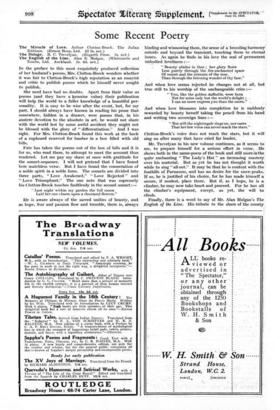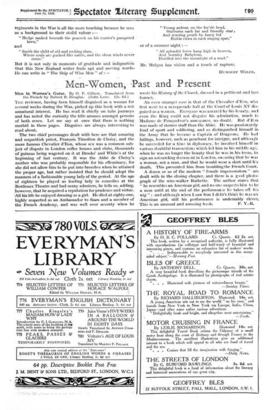Some Recent Poetry
The English of the Line. Alan E. Mulgan. (Whitcombe and Tombs, Ltd. Auckland. 2s. 6d. net.) IN the preface to this most exquisitely produced collection of her husband's poems, Mrs. Clutton-Brock wonders whether
it was fair to Clutton-Brock's high reputation as an essayist and critic to publish poems which he himself never sought to publish.
She need have had no doubts. Apart from their value as poems (and they have a 1,senuale value) their publication will help the world to a fuller knowledge of a beautiful per- sonality. It is easy to be wise after the event, but, for my part, I should always have known in reading his prose that somewhere, hidden in a drawer, were poems that, in his austere devotion to the absolute in art, he would not share with the world lest by some awful accident they might not be blessed with the glory of "differentiation." And I was right. For Mrs. Clutton-Brock found this work at the back of a cupboard reserved for lumber in a box filled with old bills.
Fate has taken the poems out of the box of bills and it is for us, who read them, to attempt to meet the account thus rendered. Let me pay my share at once with gratitude for the sonnet-sequence. I will not pretend that I have found here matchless verse. But I have found the consecration of a noble spirit in a noble form. The sonnets are divided into three parts, "Love Awakened," "Love Rejected" and "Love Triumphant." The one note that was supremely his Clutton-Brock touches faultlessly in the second sonnet :—
" Last night within my garden the full moon
Laid her one charm upon a thousand flowers."
He is aware always of the sacred unities of beauty, and as hope, fear and passion flow and tremble, there is, always binding and winnowing thein, the sense of a brooding harmony outside and beyond the transient, touching them to eternal issues. As again he finds in his love the seal of permanent unbodied loveliness
"Beauty abides in thee ; her glory flows Less purely through the fun-enchanted space Of sunset and the crimson of the rose,
Than through the listening wonder of thy face."
And when love seems rejected. he changes not at all, but true still to his worship of the unchangeable cries :—
"You, like the golden daffodils, were born Not for mine only but the world's delight ; - I can no more engross you than the morn." .
And when 'love blossoms into completion he is suddenly rewarded by beauty herself taking the pencil from his hand and writing two sovereign lines :—
" But still the nightingale singion, nor cares That her low voice can never reach the stars."
Clutton-Brock's voice does not reach the stars, but it will sing on after many that have cried far- louder.
Mr. Trevelyan in his new volume continues, as it seems to me, to prepare himself for a serious effort in verse. _ He shows both in the name-poem of the book and still more in the quite enchanting "The Lady's Hat :' an increasing mastery over his material. But as yet he has not thought it worth while to sing "all out."., It may be that he is content with the foothills of Parnassus, and has no desire for the snow-peaks.
If so, he is justified of his choice, for he has made himself a secure, if modest, place there. But if, as I hope, he is a climber, he may now take heart and proceed. For he has all the climber's equipment, except, as Yet, the will to climb.
Finally, there is a word to say of Mr. Alan Mulgan's The English of the Line. His tribute to the share of the county.
regiments in the War is all the more touching because he sees as a background to their stolid valour :—
"Hedge ranked beneath the peacock on his master's pampered lawn,"
and
"Smith the child of old and reeking slum, . Where souls ara packed like cattle, and the clean winds never come."
But it is not only in moments of gratitude and indig,natiion ' that this New Zealand Writer finds apt and moving words. He can write in "The Ship of Wise Men" of :—
" Young ardour, on the foc'sle head,
Outbursts each far and friendly star t And sfee.ring youth by fancy led Builds cities in each singing spar,"
or of a summer night :— " All splendid loves hang high in heaven, And burning Babylons.
Distilled into the moonlight of a road."
Mr. Mulgan has vision and a touch of rapture.
HUMBERT WOLFE.























































 Previous page
Previous page